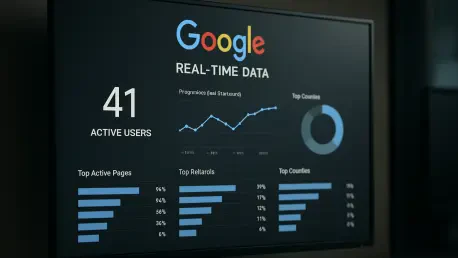In a rapidly evolving digital landscape, the unveiling of Perplexity AI’s Search API marks a seismic shift in the realm of online search, directly challenging the entrenched dominance of Google with an innovative tool that promises real-time data access across hundreds of billions of web pages. This development isn’t merely a new product release; it’s a bold maneuver in an industry where dissatisfaction with traditional search giants is mounting, particularly as Google grapples with antitrust investigations and criticism over its AI Overviews feature, which many publishers claim has slashed their website traffic. Tailored specifically for AI-driven applications, Perplexity’s API offers a glimpse into a future where speed, relevance, and ethical considerations could redefine how information is accessed and utilized. As the search engine market faces increasing scrutiny, this launch emerges as a potential turning point, sparking curiosity about whether a newcomer can truly disrupt a space long dominated by a single player.
The Technological Edge of Perplexity’s Search API
Performance and Scalability
At the heart of Perplexity AI’s new offering lies its remarkable technical prowess, characterized by a latency of under 400 milliseconds and the capacity to manage over 200 million daily queries with ease. This performance makes it an indispensable asset for developers crafting real-time AI applications, from conversational agents to data-intensive research tools. The API’s ability to deliver instantaneous results ensures that end users experience seamless interactions, a critical factor in today’s fast-paced digital environment. Beyond speed, its scalability stands out as a key strength, supporting a vast array of queries without compromising efficiency. This robust infrastructure positions Perplexity as a reliable foundation for businesses looking to integrate cutting-edge search capabilities into their systems, setting a high bar for competitors in the industry.
Another standout feature is the API’s advanced hybrid AI ranking system, which skillfully combines lexical and embedding-based methods to enhance search relevance. Unlike traditional algorithms that may struggle with nuanced queries, this approach ensures that results are not only accurate but also contextually meaningful, catering to the sophisticated needs of modern AI applications. Developers have noted that this ranking mechanism allows for more precise data retrieval, enabling tools to better understand user intent and deliver tailored responses. Such innovation is particularly vital for sectors like market research or academic analysis, where precision can make or break outcomes. As Perplexity continues to refine these capabilities, the potential for transforming how data is processed and presented grows exponentially.
Developer-Friendly Features
One of the most compelling aspects of Perplexity’s Search API is its accessibility, underscored by a pricing model that starts at just $5 per 1,000 requests, with flexible tiers designed to accommodate both startups and large enterprises. This competitive pricing strategy undercuts many existing alternatives, making high-quality search technology available to a broader range of innovators. For small teams with limited budgets, this affordability removes significant barriers to entry, allowing them to experiment with and deploy advanced AI solutions without financial strain. Additionally, the tiered structure ensures that as businesses scale, they can access enhanced features without facing prohibitive costs, fostering a supportive ecosystem for growth and experimentation in the tech space.
Enthusiasm for the API’s features is palpable among developers, especially on social platforms like X, where discussions often highlight tools such as sub-document ranking that drive innovation in conversational AI and analytics. This functionality enables more granular search results by breaking down documents into smaller, relevant segments, a boon for applications requiring detailed insights. The developer community appreciates how such features streamline the creation of personalized assistants and analytical tools, reducing the time and effort needed to sift through vast datasets. As more creators integrate these capabilities into their projects, the ripple effects could lead to a surge of novel applications, further cementing Perplexity’s role as a catalyst for technological advancement in the search domain.
Strategic Positioning Against Google
Capitalizing on Industry Discontent
Perplexity AI’s timing in launching its Search API couldn’t be more astute, as it coincides with growing frustration among publishers who have seen their traffic and revenue diminish due to Google’s AI Overviews feature. Many content creators argue that Google’s summaries often keep users on the search page rather than directing them to original sources, a practice that has sparked widespread discontent. By stepping into this fray, Perplexity positions itself as a more ethical alternative, promising to prioritize the interests of publishers alongside users. This strategic move taps into a ready audience eager for a search solution that respects the ecosystem of content creation, potentially shifting loyalties in an industry ripe for change.
Further bolstering its competitive stance are Perplexity’s proprietary Sonar models, which have demonstrated performance on par with Google’s Gemini-2.5 Pro in benchmark tests. This technical parity signals that Perplexity is not just an underdog but a formidable contender capable of matching, if not exceeding, the capabilities of established players. For businesses and developers, this equivalence means they no longer need to compromise on quality when seeking alternatives to Google’s offerings. As word spreads of these comparable strengths, Perplexity could attract a significant share of users looking for robust search tools without the baggage of industry controversies, reshaping the competitive dynamics of the market.
Ethical Practices and Challenges
A distinguishing factor for Perplexity lies in its commitment to ethical practices, particularly through inline source citations that give credit to content creators, a direct contrast to the criticisms leveled at Google’s approach. This focus resonates deeply with publishers who feel sidelined by algorithms that prioritize user retention over source attribution. By embedding transparency into its API, Perplexity not only builds trust with the content community but also sets a precedent for how search technologies can balance innovation with fairness. Such practices could become a benchmark for the industry, pressuring other players to adopt similar standards if they wish to maintain goodwill among key stakeholders.
However, Perplexity is not without its hurdles, as it faces legal risks including copyright allegations from major outlets like The New York Times. These challenges highlight potential vulnerabilities in its data practices that could hinder growth if not addressed decisively. While the company’s valuation stands at an impressive $18 billion as of July this year, sustained investor confidence will depend on navigating these controversies with transparency and accountability. Should legal disputes escalate, they might overshadow the API’s technical achievements, posing a significant threat to Perplexity’s reputation. Balancing innovation with compliance remains a critical task as the company seeks to solidify its standing in a competitive arena.
Industry Implications and Future Trends
Shift Toward AI-Centric Search
The introduction of Perplexity’s Search API underscores a broader trend of integrating AI into search technologies, positioning it as a cornerstone for next-generation applications that demand real-time responsiveness. This shift reflects a growing recognition that traditional search models are often inadequate for the complex, dynamic needs of today’s users, particularly in fields requiring up-to-the-minute data. By offering a platform that seamlessly blends AI with vast web indexing, Perplexity enables the creation of tools that can anticipate user needs with unprecedented accuracy. This evolution is not just a technical upgrade but a fundamental rethinking of how information is curated and delivered in the digital age.
Moreover, this AI-centric approach holds the promise of democratizing access to high-quality web data, paving the way for innovation in areas like personalized assistants and real-time analytics. For smaller developers or startups, the ability to tap into such powerful resources levels the playing field, allowing them to compete with larger entities in crafting sophisticated solutions. The potential applications are vast, ranging from tailored educational platforms to market trend predictors, each benefiting from the API’s capacity to handle intricate queries efficiently. As this trend gains momentum, it could inspire a wave of creativity across industries, fundamentally altering the landscape of information access.
Competitive Dynamics and Market Evolution
Perplexity’s bold entry into the search arena has the potential to redefine how users interact with information, compelling established giants like Google to innovate or risk obsolescence. By prioritizing speed, relevance, and ethical considerations, the API challenges long-standing norms, suggesting that the future of search may hinge on adaptability and user trust rather than sheer market dominance. If Perplexity continues its trajectory of rapid feature rollouts, it could force competitors to accelerate their own development cycles, leading to a more vibrant and responsive industry. This competitive pressure might ultimately benefit consumers through better tools and more equitable practices.
Analyst consensus, as reported by industry sources, points to the API’s reliability for mission-critical applications, signaling a dynamic future for the search sector. This reliability, mirrored in the robustness of Perplexity’s public search engine, assures businesses that they can depend on the platform for high-stakes operations without fear of downtime or inconsistency. Such confidence is crucial for sectors like finance or healthcare, where accurate, timely data can influence critical decisions. As the market evolves, the ripple effects of Perplexity’s innovations could catalyze broader shifts, encouraging a reevaluation of what constitutes value in search technology and setting the stage for sustained transformation.









